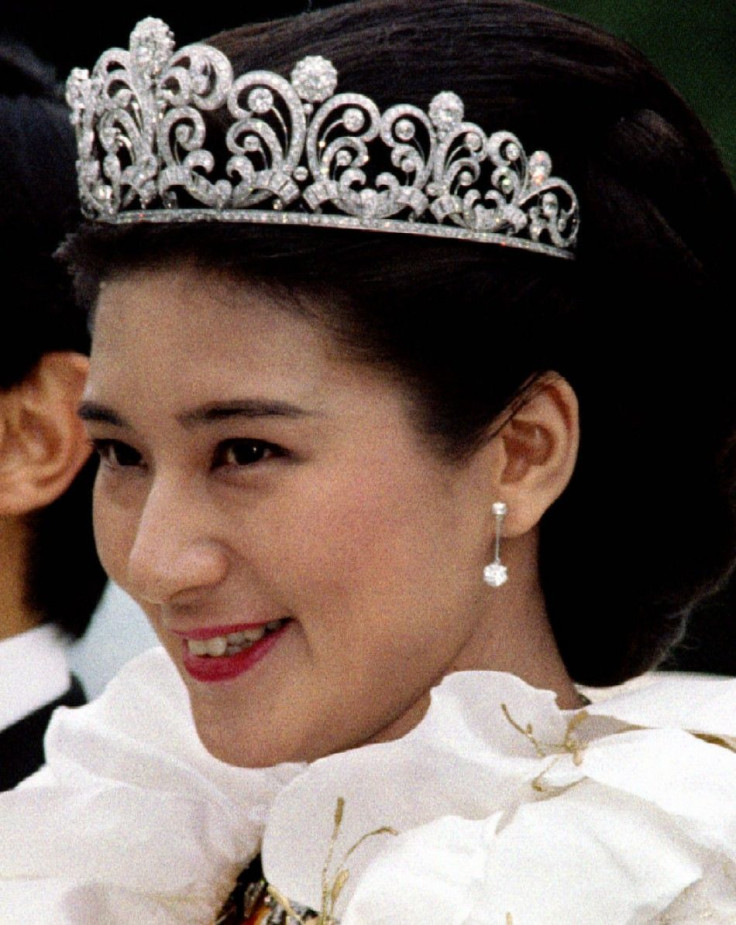Masako: Japan's Troubled, Unhappy Princess Speaks Out About Her Illness

As Britain's Kate Middleton celebrates news of her pregnancy, another princess on the other side of the world has apologized to the public for having been out of the public eye for the past 11 years.
Japan's troubled Crown Princess Masako took the occasion of her 49th birthday on Sunday to discuss the "stress-induced illness" that has allegedly caused her absence from public functions and appearances.
"As the treatment [for my illness] has lasted for a long time, I suppose that I have caused so much worry," she said in a statement, according to a statement released by the Imperial Household Agency.
However, the statement did not explictily reveal the exact nature of her illness.
"But I want to continue to make efforts to recover with the help of my doctors and other people around me. I would like to take this opportunity to express my heartfelt gratitude to all the people in the country for their continuous warm support," she added.
In her statement, Masako, the wife of the heir to Japan's throne, Crown Prince Naruhito, also mentioned her 11-year-old daughter, Princess Aiko, as well as the devastating earthquake-tsunami that struck Japan in March 2011 and killed tens of thousands of people.
Kyoji Komachi, grand master of the Crown Prince's household, told a Japanese press conference that Masako has been suffering from emotional and physicial exhaustion and is taking medication.
"I have heard from the medical team that she has been steadily recovering if viewed from a long-term perspective," Komachi said.
It has long been speculated in Japanese media and elsewhere that Princess Masako, a commoner who was educated at Oxford and Harvard and was destined for a glittering life as a diplomat, cannot cope with the demands and restrictions placed on Japanese royals.
She married the prince in 1993 after two rejections.
Under pressure to produce a male heir to carry on Japan's 2,600-year royal dynasty, things turned worse for the princess in 1999 when she miscarried.
In 2001, gave birth to princess Aiko, who as a girl, according to Japanese imperial law, cannot inherit the crown.
Her problems deepened, but the extent of her woes were shrouded in secrecy.
In December 2003, Masako was put in the hospital for shingles. By
July of the following year, she was diagnosed as suffering from "adjustment disorder" and reportedly sought medical treatment.
The question of lineage was resolved when the wife of Prince Akishino, crown prince Naruhito's younger brother, gave birth to a son, Hisahito, in September 2006. However, with the pressure to produce a son lifted, Masako still remained in seclusion.
Over the years her husband Naruhito made veiled remarks against the Imperial Household Agency for making his wife's life miserable.
According to the Shukan Shincho magazine, unnamed palace officials believe Masako suffers from chronic mild depression, which has prompted her to withdraw from public life.
"Several years before her pregnancy, the couple toured a regional city, where the local economic situation was discussed," a source at Togu Palance, the crown prince's residence, told the publication.
"There were exchanges of opinions with metropolitan and prefectural officials, followed by a meal. The next day, the princess said, 'I never wish to attend that kind of gathering again.' It was upon hearing this that I strongly recall the sense of incompatibility stemming from basic differences in her understanding from those of the imperial family."
The princeess has also had many personality clashes with palace staff, resulting in unsually high turnover.
"In the closed environment of Togu Palace, human relationships have become difficult," a member of the palace press corps told Japanese media.
She has also been criticized for being too assertive, in direct violation of the palace's demands for strictly conservative behavior.
"She was criticized by some of the media and the Imperial Household Agency for speaking for longer than her fiancé at the engagement news conference," author Naoko Tomono told the Japan Times.
"As [the Agency] are a traditionally minded body, they were reluctant to accept or understand her emotional illness or explain it to the public. They allowed the press to say that she fell ill because she was selfish, and I think that sin is grave."
© Copyright IBTimes 2024. All rights reserved.




















